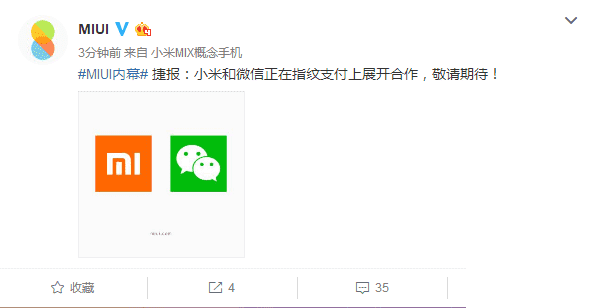Today MIUI official blog posted a short statement saying ‘Xiaomi and WeChat are in a deep cooperation to make a fingerprint payment system. So stay tuned.’ No details have been disclosed and no date was mentioned, so we can free our imagination and assume what this message can mean.
First, no steps schedule is provided. So we can think the first phone to come with such a functionality will be the Xiaomi Mi 6. There are a few reasons to think so. I mean the newer MIUI will be announced with the most important model of Xiaomi, the Mi 6. Other than that, this functionality will require fast performance. Therefore, the Xiaomi Mi 6 with its supposed Snapdragon 835 SoC is the best option for this deal.
Second, before the WeChat fingerprint microchannel payment system the manufacturer has started a cooperation with PayPal. As a result, the best of bests with this brand including the Xiaomi Mi MIX, Mi Note 2, Mi 5S, Mi 5S Plus, Mi 5, Redmi Pro and other models from the same category support the PayPal payment system accessing directly from the phones. So this is not anything new for Mi users.
About WeChat Pay
WeChat is one of the most popular messaging apps reached up to 800 million users. It was first to popularize putting brands in chat and integrating third-party services, while WhatsApp and Messenger are implementing this just now. The payment service has been the next major change WeChat should make. Thanks to a payment system the app will offer more services to its users. Thus the existing features such as text messaging, voice and video calling, social network timeline, branded accounts, shopping, and games will get a huge addition in face of WeChatPay. The latter allows users to make money transfers between WeChat users (peer-to-peer) as well as make payments online.
Well, as you see, WeChatPay is a really useful feature if taking into account how many people are currently using this app. Obviously, we are dealing with an app popular among Chinese users. But thanks to the cooperation with Xiaomi it will become popular in other markets as well. So it still remains a big question who benefits from this cooperation.







